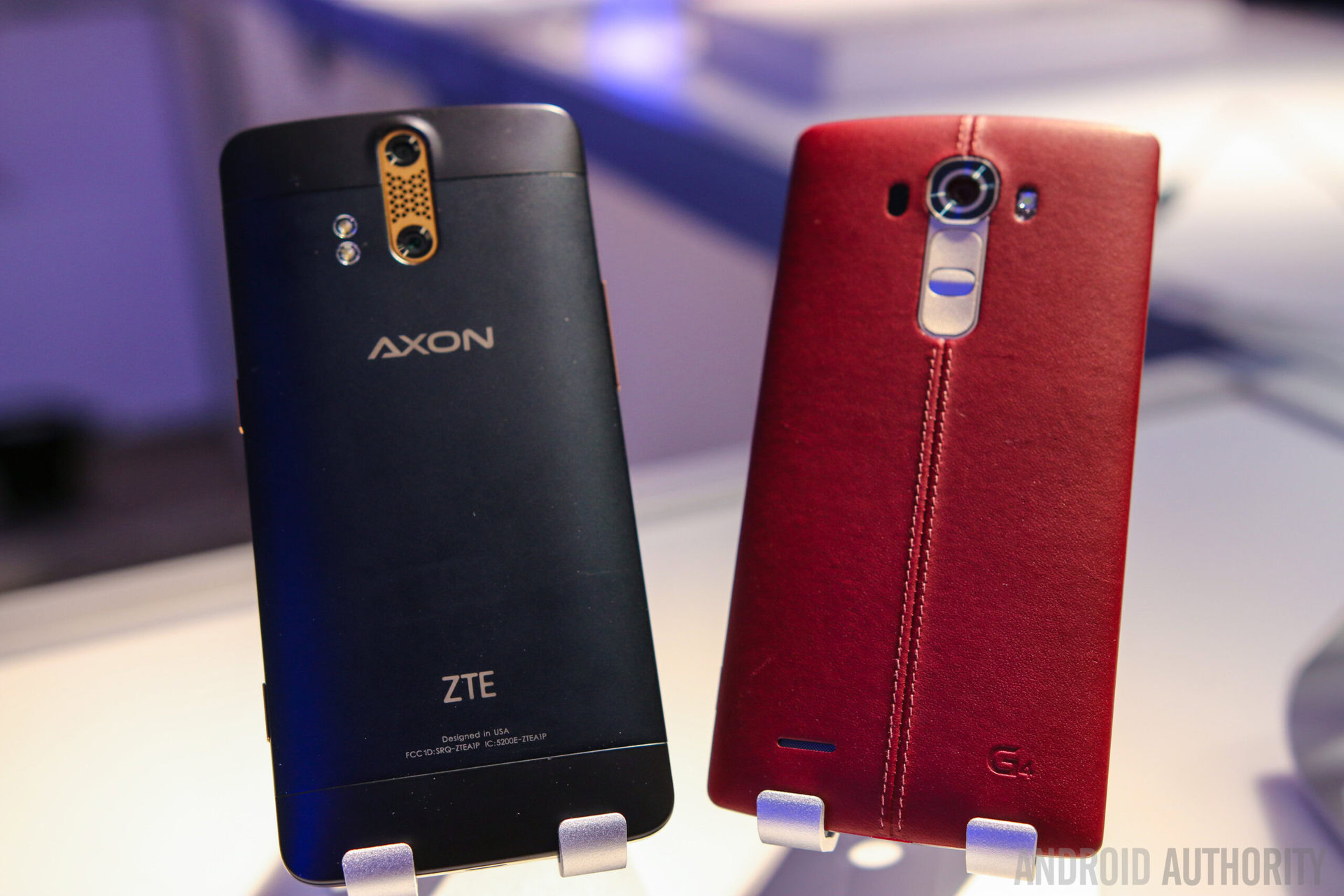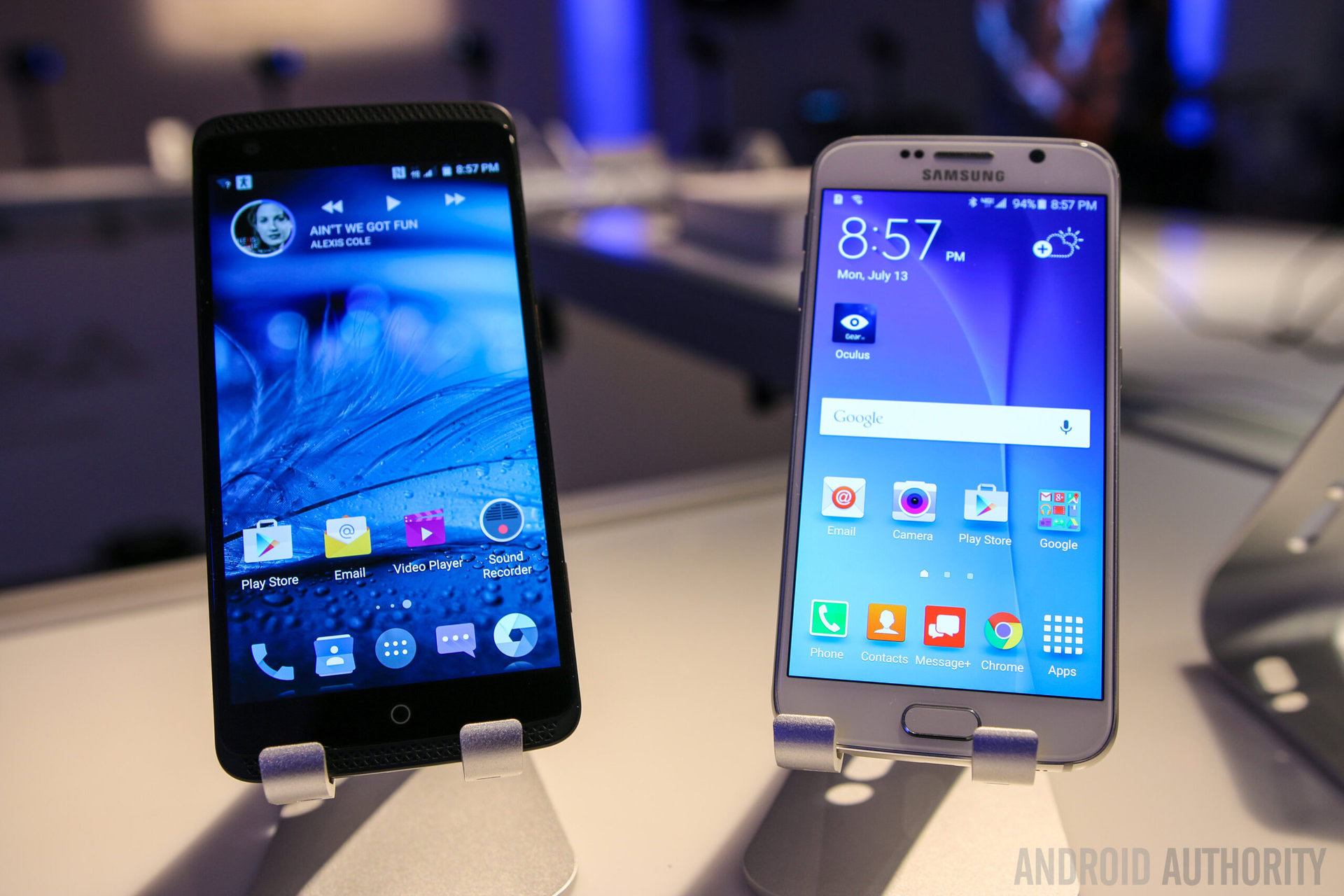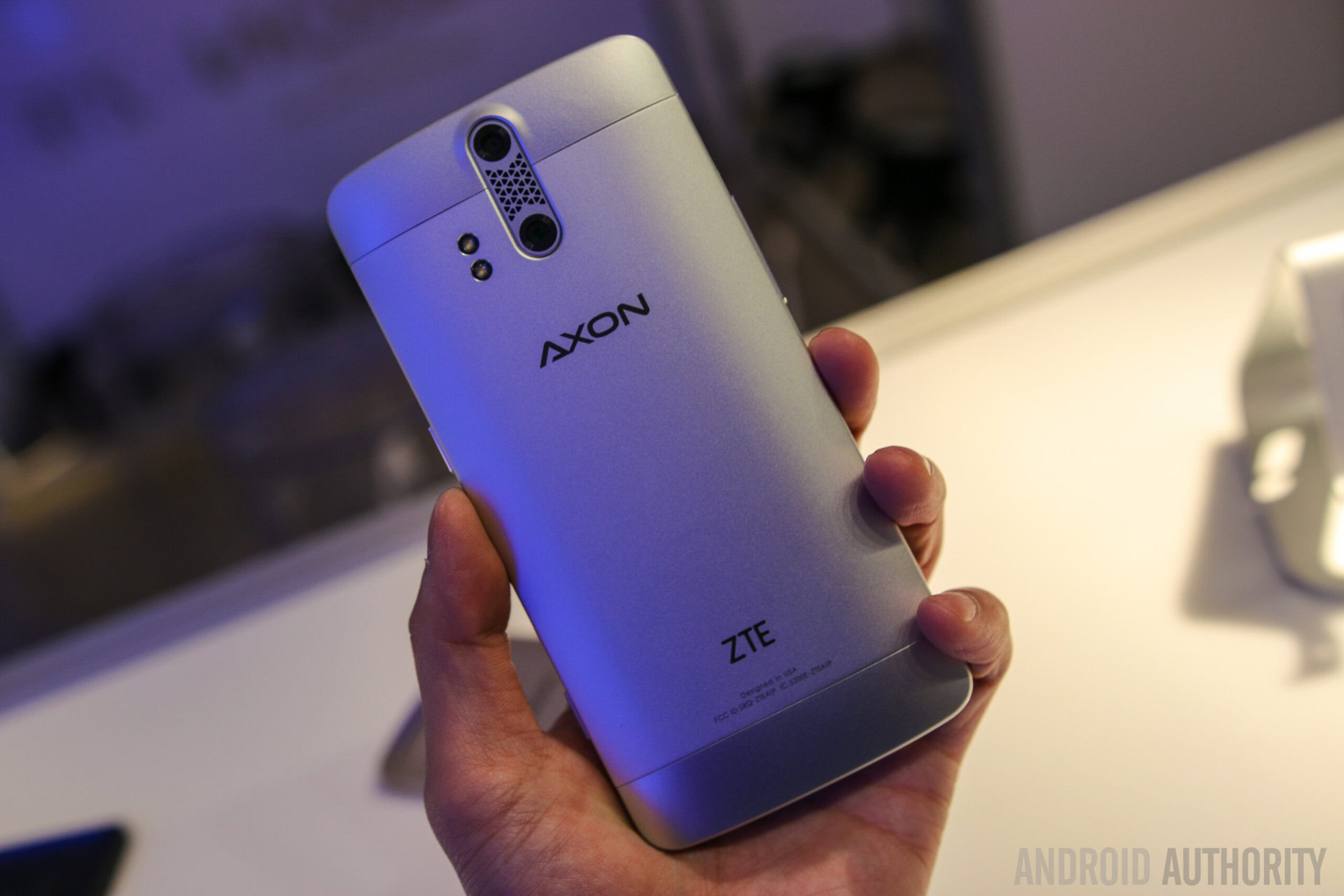Affiliate links on Android Authority may earn us a commission. Learn more.
ZTE Axon vs the competition
Published onJuly 14, 2015

ZTE has its sights set on third place in the US market and its new Axon phone wants to bring some additional competition to the established brands in the market. So let’s take a look at how the ZTE Axon’s hardware stacks up against the best of 2015’s flagship smartphones.
Beginning with the processing hardware, ZTE has opted for Qualcomm’s top-of-the-line Snapdragon 810 processor, which is built from four ARM Cortex-A57 and four Cortex-A53 cores configured in a big.LITTLE arrangement. This set-up is used throughout the 2015 flagships, even in Samsung’s Exynos chip, with the exception of the LG G4, which uses the cooler running hexa-core Snapdragon 808.
| ZTE Axon | Galaxy S6 | One M9 | Xperia Z3+ | LG G4 | |
|---|---|---|---|---|---|
Display | ZTE Axon 5.5-inch LCD QHD (2560x1440) | Galaxy S6 5.1-inch AMOLED QHD (2560x1440) | One M9 5-inch LCD FullHD (1920x1080) | Xperia Z3+ 5.2-inch LCD FullHD (1920x1080) | LG G4 5.5-inch LCD QHD (2560x1440) |
SoC | ZTE Axon Snapdragon 810 | Galaxy S6 Exynos 7420 | One M9 Snapdragon 810 | Xperia Z3+ Snapdragon 810 | LG G4 Snapdragon 808 |
CPU | ZTE Axon 4x 2.0GHz Cortex-A57 4x 1.5GHz Cortex-A53 | Galaxy S6 4x 2.1GHz Cortex-A57 4x 1.5GHz Cortex-A53 | One M9 4x 2.0GHz Cortex-A57 4x 1.5GHz Cortex-A53 | Xperia Z3+ 4x 2.0GHz Cortex-A57 4x 1.5GHz Cortex-A53 | LG G4 2x 1.8GHz Cortex-A57 4x 1.4GHz Cortex-A53 |
GPU | ZTE Axon Adreno 430 | Galaxy S6 Mali-T760 MP8 | One M9 Adreno 430 | Xperia Z3+ Adreno 430 | LG G4 Adreno 418 |
RAM | ZTE Axon 4GB | Galaxy S6 3GB | One M9 3GB | Xperia Z3+ 3GB | LG G4 3GB |
Storage | ZTE Axon 32GB | Galaxy S6 32/64/128GB | One M9 32GB | Xperia Z3+ 32GB | LG G4 32GB |
MicroSD | ZTE Axon No | Galaxy S6 No | One M9 Yes, up to 128GB | Xperia Z3+ Yes, up to 128GB | LG G4 Yes, up to 128GB |
On the GPU side we see an Adreno 430 GPU, which should be able to provide some extra graphics grunt to push additional pixels to the QHD display. This should give the handset an edge over the G4’s Adreno 418, but the lower display resolution of the One M9 or Xperia Z3+ will result in better frame rates for gamers.
While we’re on the subject of displays, the ZTE Axon matches the leaders in the field with a huge QHD (2560×1440) display resolution. At 5.5-inches, the G4 is the Axon’s closest competitor in screen size. The display is based on Sharp’s rather good LCD technology, but it probably won’t end up with as wide of a color gamut as Samsung’s AMOLED.

The one area that ZTE has decided to go above any beyond the competition is with an extra GB of RAM, bringing the total up to 4GB compared with 3GB for every other major flagship. Android has become a bit more of a memory hog these days, but you’re not going to see much of a noticeable improvement in performance by moving from 3GB to 4GB. However, very heavily multi-taskers may find that apps open a little quicker, as there’s extra room to keep these in the background on ZTE’s handset.
In terms of internal storage, ZTE’s Axon matches the 32GB of internal memory offered by most 2015 flagships. Sadly there doesn’t appear to be support for a microSD card, which might leave the phone lacking space if you’re a big media consumer. Samsung opted not to include a microSD card slot with the Galaxy S6, but at least there are models with 64 and 128GB of memory available.
In terms of performance, the ZTE Axon looks able to match the very best Android phones on the market right now.
| ZTE Axon | Galaxy S6 | One M9 | Xperia Z3+ | LG G4 | |
|---|---|---|---|---|---|
Camera | ZTE Axon dual rear (13MP, and 2MP) 8MP front | Galaxy S6 16MP rear 5MP front | One M9 20MP rear 4MP front | Xperia Z3+ 20.7MP rear 5MP front | LG G4 16MP dual rear 8MP front |
Battery | ZTE Axon 3,000mAh | Galaxy S6 2,500mAh | One M9 2,840mAh | Xperia Z3+ 2,930mAh | LG G4 3,000mAh |
LTE | ZTE Axon Category 6 | Galaxy S6 Category 6 | One M9 Category 6 | Xperia Z3+ Category 6 | LG G4 Category 6 |
Fast Charging? | ZTE Axon Quick Charge 2.0 | Galaxy S6 No | One M9 Quick Charge 2.0 | Xperia Z3+ Quick Charge 2.0 | LG G4 Quick Charge 2.0 |
Wireless Charging? | ZTE Axon No | Galaxy S6 PMA and Qi | One M9 No | Xperia Z3+ No | LG G4 Qi (optional cases) |
Dimensions | ZTE Axon 154 x 75 x 9.3mm | Galaxy S6 143.4 x 70.5 x 6.8 mm | One M9 144.6 x 69.7 x 9.6 mm | Xperia Z3+ 146 x 72 x 6.9 mm | LG G4 148.9 x 76.1 x 9.8 mm |
Weight | ZTE Axon 175g | Galaxy S6 138g | One M9 157g | Xperia Z3+ 144g | LG G4 155g |
Unlocked Price | ZTE Axon $499 | Galaxy S6 $700 | One M9 $650 | Xperia Z3+ $650 | LG G4 $540 |
Moving on to the smartphone’s additional hardware features, we can see a number of high-end features packed in. There’s no support for wireless charging or an infrared port, but the Axon does support NFC, fast LTE data speeds, and Qualcomm’s Quick Charge 2.0 technology. ZTE also touts “Hi-Fi audio” via its AKM 4961 codec, which boasts a 32-bit 192 kHz DAC, but there’s actually only one speaker at the bottom of the phone. We certainly won’t attempt to make any calls about quality without a good listen, but it will be interesting to hear how the phone stacks up with the One M9.
ZTE has also paid a lot of attention to this year’s hotly contested smartphone camera feature list. There’s a dual rear camera setup, which sports a 13 megapixel camera with a secondary 2MP cam, allowing for depth refocusing, a feature that was quite popular last generation.

Delving a little deeper into the camera specifications we note a BSI sensor which is accompanied by a 6 element lens and f/1.8 aperture, which matches the LG G4. The aperture can also apparently span to f/1.0 for superior image in low-light settings. The Axon has also opted for a higher resolution 8MP front facing camera with 88 degree wide angle lens. Again, we can’t call camera quality without some hands-on time, but the spec sheet suggests that ZTE’s phone will give Samsung, HTC, Sony and LG a run for their money.
The only marginal complaint about the paper specs seems to be that the ZTE Axon is a bit taller than other handsets of a similar size and it also weighs a little bit more. We’re really looking at a phone closer in size to the Galaxy Note 4, which some will love but others may find a little too large.

Overall, an initial look at the hardware suggests that ZTE has doubled down with the Axon and has produced a phone that appears to offer the cutting edge hardware that you would expect from a flagship smartphone at a retail price that substantially undercuts most of the competition. The LG G4 is probably the Axon’s closest rival for value for money. At $500, US consumers might be tempted to overlook ZTE’s past reputation to grab a bargain. (Update: actual price for the Axon is $450 as it turns out, not $500).